
North Carolina is currently divided into 14 congressional districts, each represented by a member of the United States House of Representatives. After the 2000 census, the number of North Carolina's seats was increased from 12 to 13 due to the state's increase in population. In the 2022 elections, per the 2020 United States census, North Carolina gained one new congressional seat for a total of 14.

The 2003 Texas redistricting was a controversial intercensus state plan that defined new congressional districts. In the 2004 elections, this redistricting supported the Republicans taking a majority of Texas's federal House seats for the first time since Reconstruction. Democrats in both houses of the Texas Legislature staged walkouts, unsuccessfully trying to prevent the changes. Opponents challenged the plan in three suits, combined when the case went to the United States Supreme Court in League of United Latin American Citizens v. Perry (2006).

Ohio is divided into 15 congressional districts, each represented by a member of the United States House of Representatives. After the 2010 census, Ohio lost two House seats due to slow population growth compared to the national average, and a new map was signed into law on September 26, 2011. Starting in the 2022 midterms, per the 2020 United States census, Ohio will lose a congressional seat.

Florida's 5th congressional district is a congressional district in the U.S. state of Florida. It includes the southeastern area of Jacksonville which comprises areas such as Arlington, East Arlington, Southside, Mandarin, San Jose, and the Beaches. It stretches south to St. Augustine in St. Johns County.

After the 2000 census, the Commonwealth of Pennsylvania was divided into 19 congressional districts, decreasing from 21 due to reapportionment.

The New Jersey Redistricting Commission is a constitutional body of the government of New Jersey tasked with redrawing the state's Congressional election districts after each decade's census. Like Arizona, Idaho, Hawaii, Montana, and Washington; the redistricting is completed within an independent, bipartisan commission. The apportionment of members of the Redistricting Commission is carefully balanced between legislative and executive majorities and is purposefully designed to allow the minority party an equal number of seats on the commission.
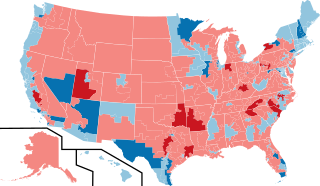
The 2012 United States House of Representatives elections were held on November 6, 2012. It coincided with the reelection of President Barack Obama. Elections were held for all 435 seats representing the 50 U.S. states and also for the delegates from the District of Columbia and five major U.S. territories. The winners of this election cycle served in the 113th United States Congress. This was the first congressional election using districts drawn up based on the 2010 United States census.

Redistricting in Pennsylvania refers to the decennial process of redrawing state legislative and federal congressional districts in Pennsylvania.
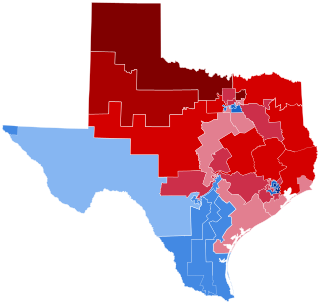
The 2012 United States House of Representatives elections in Texas were held on Tuesday, November 6, 2012, to elect the 36 U.S. representatives from the state of Texas—an increase of four seats in reapportionment following the 2010 United States Census. The elections coincided with the elections of other federal and state offices, including a quadrennial presidential election and an election for the U.S. Senate. The primary election had been scheduled to be held on March 6, 2012, with a runoff election on May 22; because of problems arising from redistricting, the primary was postponed to May 29, and the run-off to July 31.

The U.S. state of Arizona, in common with the other U.S. states, must redraw its congressional and legislative districts every ten years to reflect changes in the state and national populations. Redistricting normally follows the completion of the United States census, which is carried out by the federal government the first year of every decade; the most recent census took place in 2020. Historically, Arizona's legislature had control over the redistricting process. However, Proposition 106, passed in 2000, delegated the power to draw congressional and legislative boundaries to a bipartisan independent commission. The Arizona Independent Redistricting Commission (AIRC) comprises two Democrats, two Republicans, and one independent chair. County and local redistricting, which normally takes place along the same timeline as congressional and legislative redistricting, is carried out by the individual county and local governments rather than the AIRC.
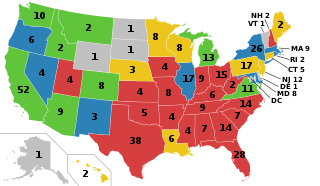
Gerrymandering is the practice of setting boundaries of electoral districts to favor specific political interests within legislative bodies, often resulting in districts with convoluted, winding boundaries rather than compact areas. The term "gerrymandering" was coined after a review of Massachusetts's redistricting maps of 1812 set by Governor Elbridge Gerry noted that one of the districts looked like a mythical salamander.
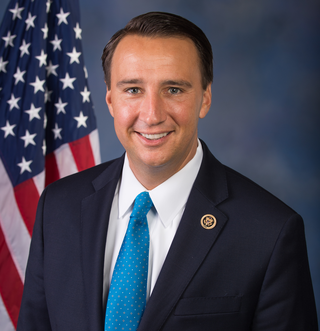
Ryan Anthony Costello is an American politician, lobbyist and attorney who served as the U.S. representative for Pennsylvania's 6th congressional district from 2015 to 2019. A member of the Republican Party, he was first elected to the Congress in the 2014 midterms. Costello previously served on the Chester County Board of Commissioners (2011–2015), which he chaired from 2013 to 2015.
The National Democratic Redistricting Committee (NDRC) is a US organization that focuses on redistricting and is affiliated with the Democratic Party. The organization coordinates campaign strategy, directs fundraising, organizes ballot initiatives and files lawsuits against state redistricting maps. At launch, the organization announced that it intends to support Democratic candidates for local and state offices in order for them to control congressional map drawing in the redistricting cycle following the 2020 United States census.

The 2020 United States redistricting cycle is in progress following the completion of the 2020 United States census. In all fifty states, various bodies are re-drawing state legislative districts. States that are apportioned more than one seat in the United States House of Representatives are also drawing new districts for that legislative body.
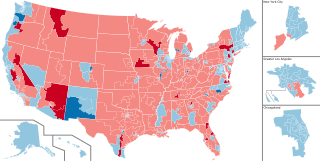
The 2022 United States House of Representatives elections occurred on November 8, 2022, as part of the 2022 United States elections during incumbent president Joe Biden's term. Representatives were elected from all 435 U.S. congressional districts across each of the 50 states to serve in the 118th United States Congress, as well as 5 non-voting members of the U.S. House of Representatives from the District of Columbia and 4 of the 5 inhabited insular areas. Numerous other federal, state, and local elections, including the 2022 U.S. Senate elections and the 2022 U.S. gubernatorial elections, were also held on the same date. This was the first election after the 2020 redistricting cycle.
REDMAP is a project of the Republican State Leadership Committee of the United States to increase Republican control of congressional seats as well as state legislatures, largely through determination of electoral district boundaries. The project has made effective use of partisan gerrymandering, by relying on previously unavailable mapping software such as Maptitude to improve the precision with which district lines are strategically drawn. The strategy was focused on swing blue states like Pennsylvania, Ohio, Michigan, North Carolina, and Wisconsin where there was a Democratic majority but which they could swing towards Republican with appropriate redistricting. The project was launched in 2010 and estimated to have cost the Republican party around US$30 million.

The 2022 United States House of Representatives elections in Nevada were held on November 8, 2022, to elect the four U.S. representatives from the state of Nevada, one from each of the state's four congressional districts. The elections coincided with the Nevada gubernatorial election, as well as other elections to the U.S. House of Representatives, elections to the U.S. Senate, and various state and local elections.

League of Women Voters of Pennsylvania et al. v. Commonwealth of Pennsylvania et al.—abbreviated League of Women Voters v. Commonwealth—was a decision of the Pennsylvania Supreme Court on gerrymandering, concerning the power of the Pennsylvania General Assembly to draw maps based on partisan advantage. The Court ruled that the maps adopted by the Republican controlled legislature in 2011 was an unconstitutional partisan gerrymander under the Constitution of Pennsylvania.
Moore v. Harper, 600 U.S. 1 (2023), is a landmark decision of the Supreme Court of the United States related to independent state legislature theory (ISL), a doctrine that asserts state legislatures have sole authority to establish election laws for federal elections within their respective states without judicial review by state courts, presentment to state governors, and without constraint by state constitutions. The case arose from the redistricting of North Carolina's districts by its legislature after the 2020 United States census, which the state courts found to be too artificial and partisan, and an extreme case of gerrymandering in favor of the Republican Party.

The 2022 New York state elections took place on November 8, 2022. On this date, the State of New York held elections for the following offices: Governor and Lieutenant Governor, Attorney General, Comptroller, U.S. Senate, U.S. House of Representatives, New York State Senate, New York State Assembly, and various others. Primary elections took place on June 28 and August 23, 2022. This election cycle was highlighted by a redistricting process in which there were many election maps that were ultimately ruled to be unconstitutional Democratic gerrymanders.

















